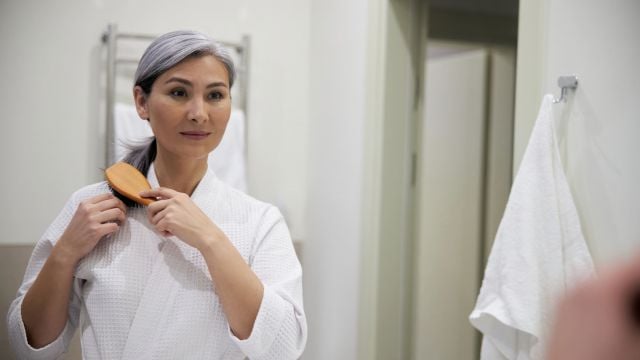From dealing with dandruff, to how often you should shampoo, you may be surprised to learn that some commonly-held beliefs about hair are actually myths.
Here, experts share seven surprising facts about hair…
1. Hair needs feeding
Anabel Kingsley, trichologist at Philip Kingsley, says clients frequently tell her they’re eating a ‘healthy’ diet devoid of sugar or junk food, but what they don’t realise is they’re often not providing their hair with all the nutrients it needs.
“The wrong diet is a very common cause of excessive daily hair loss, called telogen effluvium,” Kingsley says. “While hair is incredibly important to us psychologically, physiologically our body could not care less. Any nutrients ingested first go to essential systems, with hair, a non-essential tissue, receiving whatever is left over.”
Hair is made primarily of protein, therefore she recommends ensuring you’re getting enough protein in your diet. Healthy snacking might also be a good idea: “Energy to form hair cells drops four hours after eating, so if longer than this is left between meals, snack on a nutrient-dense carbohydrate, such as fresh fruit or wholegrain crackers.”
2. Shiny hair isn’t always healthy
“Shiny hair can be a sign of healthy hair, but shiny hair is only a reflection of light from the hair strands,” says Kingsley. “Conditioners help to smooth and flatten the hair’s cuticle” – but it could be that your hair is damaged and weak underneath.
“Conditioning your hair with a pre-styling conditioning treatment like the Philip Kingsley Elasti-Styler 5-in-1 Treatment (£34) before you style can help to minimise damage.”
Struggling to get your blonde locks looking glossy? “Dark hair is naturally more shiny than blonde hair because of how it refracts the light,” says Leigh Keates, John Frieda UK creative director.
“However, this doesn’t mean blonde hair can’t shine. Make sure you’re using a lightweight conditioner, as this doesn’t weigh down the individual strands.”
3. Dandruff is not just a dry scalp
(iStock/PA)
“Do not confuse common dandruff with other forms of scalp flaking,” Kingsley warns, as it’s not caused by having dry skin. “Dandruff is usually oily, so don’t rub in oil to remove it, you’ll only get oilier flakes.”
Instead, she recommends first trying a targeted over-the-counter shampoo: “If anti-dandruff shampoos do not help, visit your doctor, as you may have psoriasis or eczema.”
4. Frizz is more common in winter
(iStock/PA)
“Whilst you might naturally think that hot, sunny days are a recipe for frizz and flyaways, in the UK at least, the opposite is true,” Keates says. “Our higher rainfall over the winter months means the humidity levels are actually higher than at the height of summer, making our hair more prone to frizz.”
He says that “attack is the first line of defence” when it comes frizz, so try a smoothing serum suitable for your hair type, like John Frieda Frizz Ease Perfect Finish Serum (£6.99, Boots), which can be used on wet or dry hair.
5. Shampooing every day isn’t bad for your hair
“Washing your hair every day isn’t inherently ‘bad’ for your hair,” says Keates, “so long as you’re using products suitable for your hair type, and that don’t ‘strip’ the hair.
“It’s more likely daily heat styling which is causing damage and dryness, so if you’re going to wash your hair daily, try air-drying at least a couple of times a week to help maintain a healthy condition.”
Kingsley says using too much shampoo won’t harm your hair, but you must ensure you rinse it thoroughly: “Insufficient rinsing of shampoo is one of the most common causes of dull hair that we see.”
6. There is no such thing as ‘over conditioning’ your hair
Similarly, you won’t damage your hair if you use too much conditioner – but you could weigh it down, making it look limp if you overload it with product.
“Only apply conditioner to your mid-lengths and ends, where the hair is older and it is needed the most,” says Kingsley. “If you apply it too close to your roots, you will weigh them down.”







